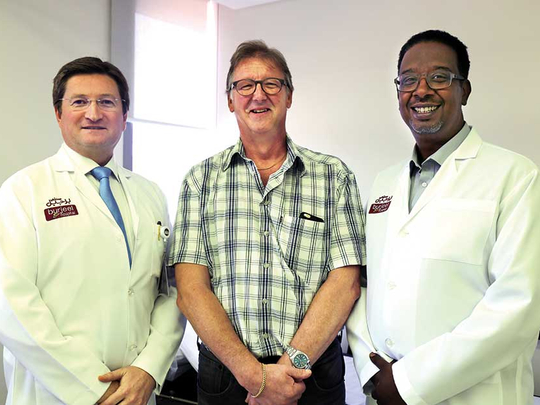
Dubai: A Swedish expatriate suffering from colorectal cancer was discharged two days after undergoing a rare minimal invasive surgery at Burjeel Hospital, Abu Dhabi.
The hospital’s advanced recovery programme ensured that 60-year old Martin Fosberg recovered quickly and was discharged on the second post-operative day, having walked 4.2km around the hospital in the morning. He was able to visit a restaurant with his family on the third day and go shopping on the fourth day.
Post-surgery reports indicated that the cancer had been completely removed, but as is routine for bowel cancers, Fosberg will undergo six months of chemotherapy at Burjeel Hospital.
According to Health Authority Abu Dhabi (HAAD), colorectal cancer is the second-most common cancer in the emirate after breast cancer, accounting for 11.5 per cent of all cases. The figures show that 85 per cent of cases are in patients aged 40 years and older, and the majority are presenting with advanced disease.
Burjeel Hospital’s consultant colorectal surgeons, Dr Mathew Tytherleigh and Dr Abdul Rahman Omer, performed a Right Hemicolectomy, a surgery to remove part of the colon, or large intestine, on Fosberg.
Three tiny abdominal incisions less than a centimetre long were used to introduce long instruments and a camera into the abdomen so that the part of the bowel with the cancer could be mobilised and cut out.
A further incision of about 5cm around the navel was made to remove the cancerous part of the bowel. Finallyt, the two ends of bowel were joined.
Dr Tytherleigh told Gulf News: “The enhanced recovery programme improves patient care by reducing the stress of surgery by many different means, such as laparoscopic (keyhole) surgery, early feeding and mobilisation. It results in a better patient experience, less complications and the patient is discharged home sooner.”
Fosberg first visited the gastroenterology department at Burjeel Hospital with symptoms of anaemia, including palpitations and tiredness. His blood tests confirmed that the level of haemoglobin in his blood was low and he underwent an endoscopy to look at the gullet and stomach followed by a colonoscopy to look at the large bowel.
Tests confirmed that in the first part of the large bowel there was a growth that was sent for biopsy, which confirmed it to be malignant.
Fosberg then underwent a CT scan of his body, which showed that the cancer had not spread to any other organs.
Dr Rahman told Gulf News: “There has been an rise in colorectal cancer cases over the past few years. However, early detection and putting patients on enhanced recovery programmes has helped improve patient care. Simple tests and screenings are the first step towards detection. As such, we suggest that patients who are experiencing bowel or abdominal problems, such as changes in their bowel habit or anal bleeding should undergo these investigations to detect the problem quickly.”
Fosberg, who is relieved and delighted with his recovery, told Gulf News: “The treatment I received was first-rate. To be able to undergo major surgery and be home in a couple of days was amazing. When I got home, Dr Tytherleigh kept in contact via telephone and texting and this was very reassuring.”
Fosberg also cautioned other residents about colorectal cancer incidence. “If you notice a change in your bowel movement habits, or see blood in the stool, you must go for an examination and if diagnosed, make sure your surgeon has been properly trained in bowel cancer surgery. And ask for enhanced recovery [programme].”












